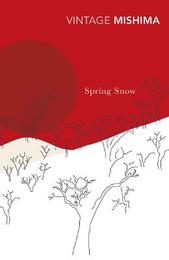
|
Spring Snow
Paperback / softback
Main Details
| Title |
Spring Snow
|
| Authors and Contributors |
By (author) Yukio Mishima
|
| Physical Properties |
| Format:Paperback / softback | | Pages:400 | | Dimensions(mm): Height 198,Width 129 |
|
| Category/Genre | Modern and contemporary fiction (post c 1945) |
|---|
| ISBN/Barcode |
9780099282990
|
| Classifications | Dewey:895.635 |
|---|
| Audience | |
|---|
|
Publishing Details |
| Publisher |
Vintage Publishing
|
| Imprint |
Vintage Classics
|
| Publication Date |
11 March 1999 |
| Publication Country |
United Kingdom
|
Description
The first novel in Mishima's masterful Sea of Fertility tetraology Tokyo, 1912. The closed world of the ancient aristocracy is being breached for the first time by outsiders - rich provincial families, a new and powerful political and social elite. Kiyoaki has been raised among the elegant Ayakura family - members of the waning aristocracy - but he is not one of them. Coming of age, he is caught up in the tensions between old and new, and his feelings for the exquisite, spirited Satoko, observed from the sidelines by his devoted friend Honda. When Satoko is engaged to a royal prince, Kiyoaki realises the magnitude of his passion.
Author Biography
Yukio Mishima was born into a samurai family and imbued with the code of complete control over mind and body, and loyalty to the Emperor - the same code that produced the austerity and self-sacrifice of Zen. He wrote countless stories and thirty-three plays, in some of which he performed. Several films have been made from his novels, including The Sound of Waves, Enjo which was based on The Temple of the Golden Pavilion and The Sailor Who Fell From Grace with the Sea. Among his other works are the novels Confessions of a Mask and Thirst for Love and the short story collections Death in Midsummer and Acts of Worship. The Sea of Fertility tetralogy, however, is his masterpiece. After Mishima conceived the idea of The Sea of Fertility in 1964, he frequently said he would die when it was completed. On 25 November 1970, the day he completed The Decay of the Angel, the last novel of the cycle, Mishima committed seppuku (ritual suicide) at the age of forty-five.
Reviews[a] beautiful and austere tale... written in lush, languid prose, filled with beautiful sentences and turns of phrase, this is one of the most enjoyable books I have read this year * Reading Matters * Romantic obsession and sexual intrigue meet in the sumptuous historical melodrama * Variety * An austere love story, probably my favourite of his novels -- David Mitchell * Independent on Sunday * Mishima is the Japanese Hemingway * Life magazine * This tetralogy is considered one of Yukio Mishima's greatest works. It could also be considered a catalogue of Mishima's obsessions with death, sexuality and the samurai ethic. Spanning much of the 20th century, the tetralogy begins in 1912 when Shigekuni Honda is a young man and ends in the 1960s with Honda old and unable to distinguish reality from illusion. En route, the books chronicle the changes in Japan that meant the devaluation of the samurai tradition and the waning of the aristocracy. * Washington Post *
|